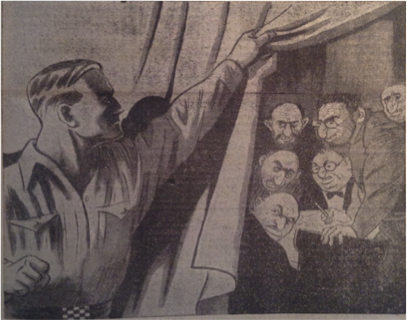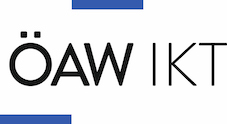Veranstaltungen
Mit seinen wissenschaftlichen Veranstaltungen versucht das Wiener Wiesenthal Institut für Holocaust-Studien (VWI) die neuesten Ergebnisse im Bereich der Holocaust-, Genozid- und Rassismusforschung einem breiteren ebenso wie einem ausgewiesenen Fachpublikum regelmäßig näher zu bringen. Die unterschiedlichen Formate dieser über einen engen Wissenschaftsbegriff hinausweisenden Veranstaltungen, die von in einem kleinen Rahmen gehaltenen gehaltenen Vorträgen, den Simon Wiesenthal Lectures über für ein Fachpublikum interessante Workshops bis zu großen internationalen Tagungen, den Simon Wiesenthal Conferences reichen, spiegeln das breite Tätigkeitsfeld des Instituts wider.
Präsentationen von ausgewählten Neuerscheinungen zu den einschlägigen Themen des Instituts, Interventionen im öffentlichen Raum, die Filmreihe VWI Visuals und die Fachkolloquien der Fellows runden die Palette der Veranstaltungen des Instituts weiter ab.
| VWI invites/goes to... | |||
| Lovro Kralj: Paving the Road of Death. Antisemitism in the Ustasha Movement 1929–1945 | |||
Mittwoch, 15. Jänner 2020, 15:00 - 17:00 Vienna Wiesenthal Institute, Research Lounge 1010 Vienna, Rabensteig 3, 3rd Floor
|
|||
VWI invites the Institute of Culture Studies and Theatre History at the Austrian Academy of Sciences
Commented by Ljiljana Radonić Lovro Kralj specialises in the fields of fascism, antisemitism, and Holocaust studies, with a geographic focus on Central and Southeastern Europe. In 2015, he started his PhD at the Central Eu-ropean University. Kralj has participated and presented at more than twenty international workshops and conferences, including Lessons & Legacies. He has received multiple fellowships, including the Sharon Abramson Research Grant for the Study of the Holocaust from the Holocaust Educational Foundation and a Junior Fellowship at the Vienna Wiesenthal Institute for Holocaust Studies. Ljiljana Radonić heads an ERC project entitled Globalized Memorial Museums. Exhibiting Atrocities in the Era of Claims for Moral Universals at the Institute of Culture Studies and Theatre History of the Austrian Academy of Sciences in Vienna. She wrote her habilitation on World War II in Post-Communist Memorial Museums at the Department of Political Science at the University of Vienna. Her PhD dealt with the War on Memory. Croatian Memory Politics between Revisionism and European Standards, Frankfurt 2010. Please register at Diese E-Mail-Adresse ist vor Spambots geschützt! Zur Anzeige muss JavaScript eingeschaltet sein! by latest 14 January, 12.00 am and bring your ID! Click here to download the invitation as a PDF file. In cooperation with |
|||






 This presentation reinterprets the importance of antisemitism in the fascist Croatian Ustasha movement. Given the fact that the Ustasha ideological core was initially not antisemitic, questions as to why and how they adopted antisemitism have not been adequately answered to date. In this presentation, Kralj will challenge historiographical interpretations which reduce Ustasha antisemitism to a mere imitation of Nazism as well as the arguments that the Ustashe only participated in the Holocaust because of German pressure or appeasement. Kralj argues that the Ustashe adopted antisemitism as a key tool in the fascistisation of its ideology. The adoption of anti-communism, anti-capitalism, anti-democratic, and other attitudes were so closely intertwined with antisemitism that it became one of the main tools of ideology-building in the period from 1935 to 1940. Kralj will examine the interdependence of antisemitism and fascistisation through a quantitative analysis of Croatian National Socialist, clerical, nationalist, and Ustasha press in the period from 1929 to 1945.
This presentation reinterprets the importance of antisemitism in the fascist Croatian Ustasha movement. Given the fact that the Ustasha ideological core was initially not antisemitic, questions as to why and how they adopted antisemitism have not been adequately answered to date. In this presentation, Kralj will challenge historiographical interpretations which reduce Ustasha antisemitism to a mere imitation of Nazism as well as the arguments that the Ustashe only participated in the Holocaust because of German pressure or appeasement. Kralj argues that the Ustashe adopted antisemitism as a key tool in the fascistisation of its ideology. The adoption of anti-communism, anti-capitalism, anti-democratic, and other attitudes were so closely intertwined with antisemitism that it became one of the main tools of ideology-building in the period from 1935 to 1940. Kralj will examine the interdependence of antisemitism and fascistisation through a quantitative analysis of Croatian National Socialist, clerical, nationalist, and Ustasha press in the period from 1929 to 1945.